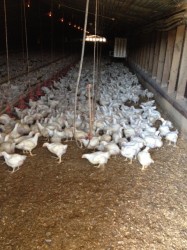Georgia Prepared to Handle Avian Influenza Outbreak if it Occurs, Says Collins
 The Avian Influenza virus has already struck in some parts of the U.S. this winter, but so far, it has not affected the poultry industry in Georgia.
The Avian Influenza virus has already struck in some parts of the U.S. this winter, but so far, it has not affected the poultry industry in Georgia.
Earlier this month over 400,000 turkeys and chickens had to be destroyed at poultry farms in southern Indiana because the virus had spread there.
Last week, the International Poultry Expo was held in Atlanta.
Over 1,300 exhibitors were on hand at the Georgia World Congress Center with some 30,000 people coming to see the latest products and services for the poultry industry.
One of those attending was U.S. Congressman Doug Collins whose 9th District encompasses the largest poultry producing area in Georgia.
Collins said Georgia is ready to respond, should the avian influenza virus strike here.
“What the takeaways were from the outbreak have shown here in Georgia how Commissioner Black and our office and other offices are working together to make sure we have a federal and state response ready to go if we have outbreak at any farm here ,” Collins said. “I think Georgia is in a very good position to react.”
Closer to home in Franklin County, where poultry farming is the main agribusiness, it could wipe out the industry and put hundreds of farmers out of business if the virus hits here.
Collins, who also owns poultry houses, says if the avian influenza virus hit just one poultry house in his 9th District could cause a ripple effect across the poultry industry in Georgia.
“Not only in Franklin, Hart, Madison, Habersham, Banks and Hall counties, when you get 20%, 30% 40% of your farms offline for longer than six months, then it’s just a staggering effect at that point,” he said. “It’s farmers that are unable to produce income and can’t pay their bills, you have processors that can’t meet their commitments for fresh chickens and eggs, it’s just a snowball effect. So that’s why it’s so important to the compact nature of the poultry industry especially in the 9th District. So that’s why this is such a concern.”
So far, no cases of avian influenza have been reported in Georgia.
Over the past year, Georgia’s poultry industry has been working closely with the CDC and the Georgia Poultry Association to educate farmers on ways to prevent the spread of the virus, which usually hits in the winter months when wild water fowl is actively migrating.
Collins said he is has been working both with state and federal agencies.
“We’ve been very coordinated with Gary Black’s office in Georgia, with the Department of Ag office in DC and also dealing with issues such as ventilation shut-down to take care of flocks. Those are the issues we’re dealing with to make sure we have every tool in the toolbox to make sure we can put a stop to the virus in the quickest, possible way,” Collins said.
In Georgia, poultry farming is a $6-billion dollar industry.
